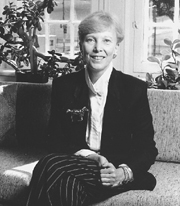 |
 |
|
|
 Gail Valaskakis, former Arts
and Science dean
Gail Valaskakis, former Arts
and Science dean
|
by Barbara Black
Look for Gail Guthrie
Valaskakis, former Concordia Dean of Arts and Science, on national television
this spring.
She has won a national Aboriginal Achievement Awards in the category of
Media and Communications for her academic work, which was done for the most
part at Concordia between 1970 and 1997. The awards were presented at a
gala in Winnipeg last Sunday night, and the event will be broadcast by CBC
sometime in April.
Valaskakis is Canada’s leading authority on northern and aboriginal
media and communications. Back in the late 1960s, she began travelling to
the North to do the fieldwork for her doctoral dissertation.
She studied the impact that a satellite system would have on the people
and their traditional way of life. Through this research, she came to play
a pivotal role as an advisor to native groups who were establishing their
own communications systems.
She wrote a report for the Royal Commission on Aboriginal Peoples, and many
articles and papers on the subject. She was invited to lecture in China,
Russia, Israel, the U.S. and at universities across Canada.
She left Concordia in 1997, and wrote a book. Gail now lives and works in
Ottawa, where she is director of research for the Aboriginal Healing Foundation.
This organization was established in 1998 in response to the concerns raised
in the Royal Commission in the mid-90s about the impact of residential schools.
Between 1863 and 1983, approximately 107,000 aboriginal people attended
130 residential schools run by the national churches and funded by the government.
For many, this led to the loss of their languages, cultures and families;
for some, it involved traumatic physical and sexual abuse.
In January 1998, the federal government created a “healing fund”
of $350 million. The Aboriginal Healing Foundation is a not-for-profit organization
established to manage this fund. It focuses on assessing, funding and monitoring
almost 500 healing programs that range from healing circles to specialized
trauma centres.
As research director, Valaskakis identifies and promotes the “best
healing practices” that emerge from aboriginal projects, particularly
in relation to sex offenders, physical abuse and the intergenerational impacts
of residential school experience.
In an article she wrote recently for the Concordia Pensioners Association
newsletter, she said, “These research areas are challenging, because
there is little aboriginal-specific data or literature, especially in relation
to Inuit and Métis communities, and we are working in a tight timeframe.
“To support our research agenda, the Foundation has partnered with
the Aboriginal Mental Health Research Team, which is sponsored by McGill
University and the Jewish General Hospital, to apply for a five-year SSHRC
grant through the Community Alliances for Health Research Program.
“Research, too, hopes to contribute to greater understanding within
not only the general public, but among aboriginal children and their parents
and grandparents through the development of school curricula and other resources.
“We may not know the extent of our impact for years, but we’re
encouraged by the feedback we’ve had from some communities. The Foundation
looks forward to sharing what we learn with aboriginal communities and others
through our Web site, publications and resource centre.”
Gail’s work at the Aboriginal Healing Foundation has led to other activities
in Ottawa, including the editorial board of ISUMA, the new Canadian Journal
of Policy Research, and the co-chairship of a group of aboriginal scholars
who are undertaking an horizontal research project in partnership with an
inter-departmental government committee, an initiative that is sponsored
by the Policy Research Secretariat.
|
|
|



